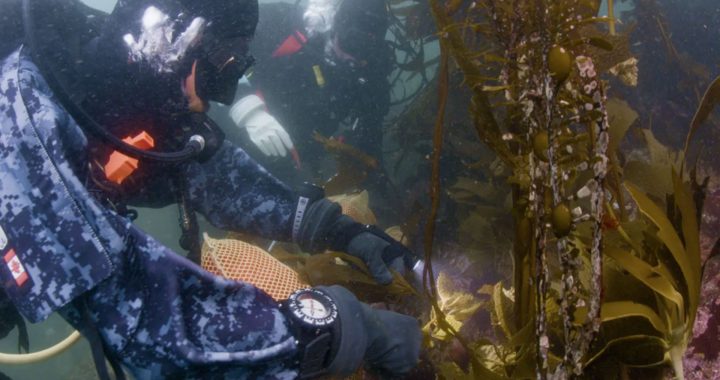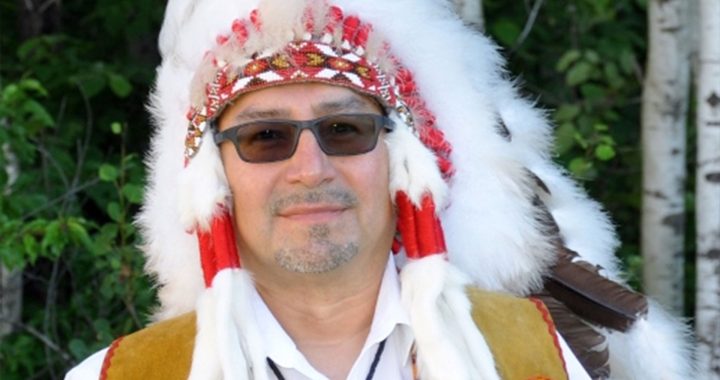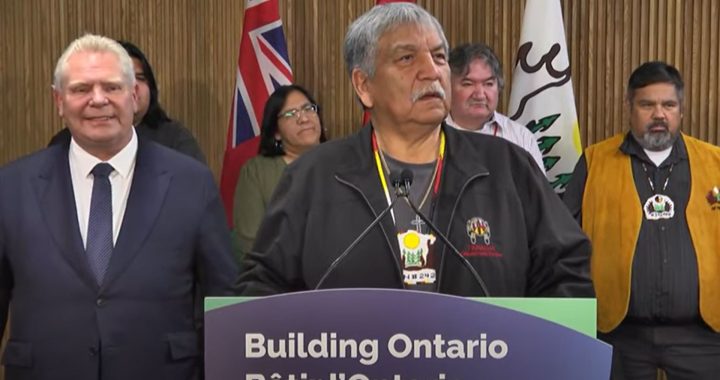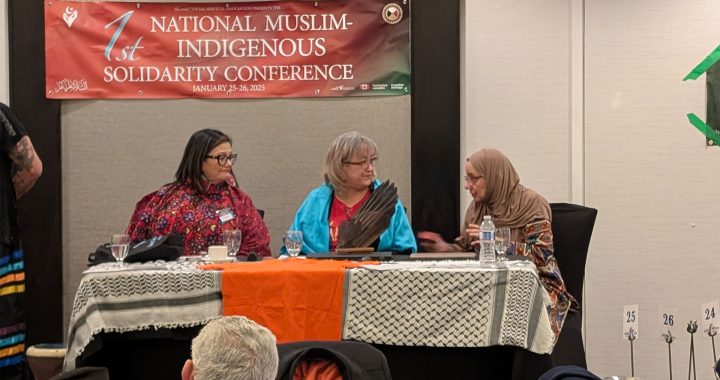It was a busy year in northern British Columbia. APTN News video journalist Lee Wilson looks back at his stories beginning with a journey from Terrace to Prince George along Highway 16, also known as the Highway of Tears.
It’s notorious due to the high number of people who have gone missing here since the 1970s. Many of the cases are Indigenous women and girls.
Early in the year, the federal, provincial governments and the telecommunication industry announced plans to make it safer with cell phone coverage on 100 per cent of the route by 2022.
In an interview with APTN News, Mary Teegee, a long-time MMIWG advocate, said that families have been pushing for this for decades.
“So in order for us to get to the table, we need to be strong, we need to speak up, and we need to demand our rightful place ensuring the healing of our nations happens, and it’s not just something that happens that is going to be given,” she said.
Enbridge unwelcome
Another story from Prince George was Lheidli T’enneh First Nation announcing that multinational pipeline company Enbridge was no longer welcome on the territory.
The First Nation and Enbridge had been in negotiations to settle a lawsuit filed by the nation after a natural gas pipeline explosion in 2018 led to the evacuation of Lheidli communities.
Enbridge remains on the territory, and the company responded to APTN with an emailed statement that they still hope to find a settlement.
Malcolm McPherson, Lheidli T’enneh’s lawyer, stated they ended talks and want Enbridge out.
“We are done playing the finger-pointing game. Enbridge, you’re a multi-national corporation, and B.C., you’re both the Crown. It’s supposed to be a Crown undivided. Get in the room together, and if you are truly committed to UNDRIP do the right thing and stop playing this silly shell game which is not serving anyone’s interests,” he said.
Forestry fight at Fairy Creek
More land disputes dominated the headlines in B.C.
Since May 2020, environmental groups have been blocking logging roads into an area known as Fairy Creek near Port Renfrew on Vancouver Island.
The blockades started after they learned old growth logging would be taking place there.
This April, Surrey-based logging company Teal Jones was granted B.C. Supreme Court injunction to access Tree Farm Licence 46. Fairy Creek is an included area.
The land is on Pacheedaht traditional territory and the First Nation has a revenue-sharing agreement with the provincial government.
Pacheedaht First Nation leadership asked those protesting to leave. But one of the leaders in Fairy Creek is Pacheedaht Elder William Jones. He invited more people to join the protest, and they set up more blockades.
The first arrests for violating the injunction started in mid-May.
While chained to a gate on a logging road, Rainbow Eyes, a spokesperson for the Rainforest Flying Squad, said they are there to stand up to government and industry.
“We’re here to stand with the people who have lived on these lands for generations. Government and industry are trying to take our lands from us and it’s ours. So we’re here to stand up,” she said.
According to RCMP press release at the start of December, the old-growth dispute in Fairy Creek continues with nearly 1,200 arrested.
Remembering victims of residential schools
In June, after discovering unmarked graves at the former Kamloops Indian Residential School, there were multiple church burnings on or near First Nation communities in the interior of B.C., one in Tofino on Vancouver Island and another in Gitwangak in northern B.C.
On Canada Day in Prince Rupert, a rally in honour of the children who did not make it home from residential school was held by survivors, healers, artists and local leaders.
A sea of orange shirts marched through the streets of Prince Rupert, as hundreds marched from city hall to an event at the waterfront.
Lax Kwa’alaams artist and event organizer Lianna Spence says they can make a yearly event for the day honour residential school survivors.
“This day is about mourning all the mass graves that they are finding every day and honouring and thanking our survivors that made it possible for people like me to be here,” she said.
Gitxsan block road
This summer, Gitxsan hereditary chiefs set up a blockade on a logging road to protect their territory from potential clear-cutting.
Regional forestry workers initially came to the logging road near Kispiox to remove the gate but were turned away.
The province announced they were pausing forestry operations in the area as all parties talked.
Denzel Sutherland-Wilson, a spokesperson for the Gitxsan House Git’luuhl’um’hetxwit, said they have a duty to take care of their land, and re-occupation is the next step.
“It’s our next move in this fight that we have going on for the last 150 years basically, but it’s also for our own healing and for our own peace.”
Coastal GasLink standoff continues
In the fall, the Wet’suwet’en and Coastal GasLink (CGL) pipeline conflict started building again.
RCMP enforced a civil injunction for the last two years that allows CGL to operate in the area.
The pipeline has 20 signed agreements with First Nation bands along the route, but Wet’suwet’en hereditary chiefs remain opposed to any pipeline passing their territory.
The Gidimt’en Clan and supporters set up blockades to protect their headwaters.
Then in November, Wet’suwet’en Hereditary Chief Woos issued an evacuation order to CGL and blocked the road controlling access to the territory. CGL stated they had about 500 workers trapped in work camps behind the blockades.
The RCMP then raided Wet’suwet’en camps and blockade sites for a third consecutive year with more 30 arrests.
Sleydo’, Gidimt’en access point spokesperson, said after the arrests that they would remain to uphold Wet’suwet’en law.
“The fact that the Wet’suwet’en hereditary chiefs and the Gitxsan hereditary chiefs had title and never extinguished their title – that means that we still have title to the land and that we are the decision-makers, that our clan system and our decision-making system in that clan governance is the decision-making body,” she said.










